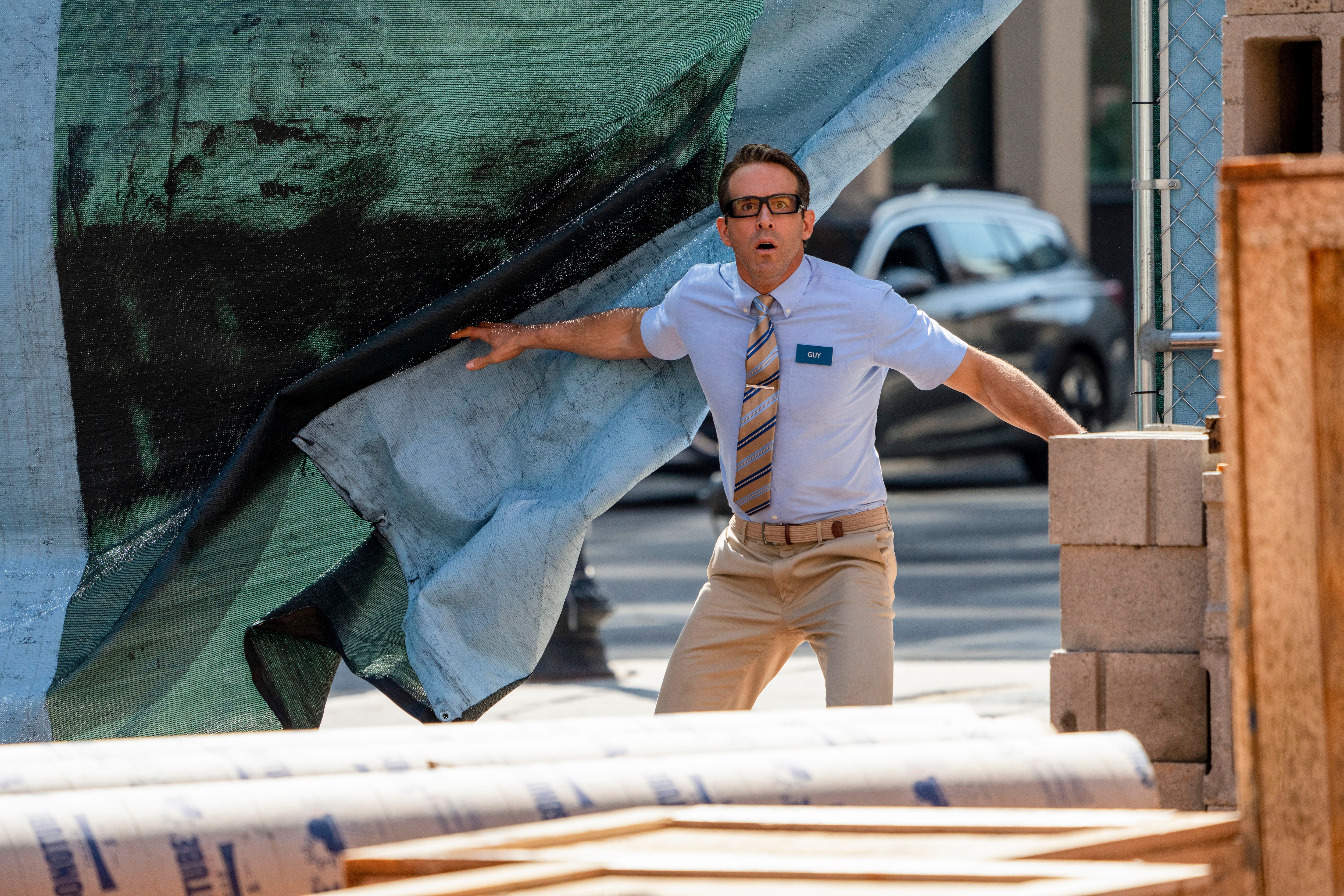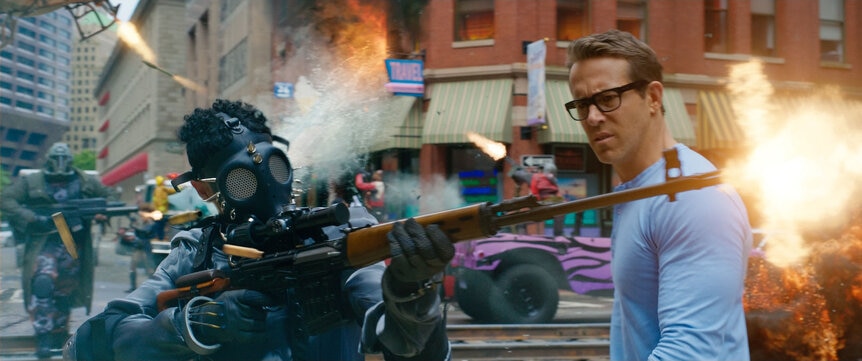Create a free profile to get unlimited access to exclusive videos, sweepstakes, and more!
'Free Guy' director Shawn Levy made a video game movie that's a movie-movie first

The thing about Free Guy, the new movie starring Ryan Reynolds as a video game NPC who becomes self-aware, is that it's not really a video game movie. Sure, the majority of it takes place inside a fictional game that's like a combination of Grand Theft Auto and Fortnite, and yes, there are lots of cameos by real-life streamers. But, director Shawn Levy says it was essential that the film — a surprising exploration of self-awareness and agency — work as a movie first and foremost even as it made sure to get all the details of the gaming world right.
While total gaming n00bs might be confused by some aspects of Free Guy, Levy and Reynolds have largely succeeded in making a video game movie that works as a movie movie. Pity, then, that they weren't able to make a video game adaptation of their video game movie.
"People wanted to make a video game," Levy tells SYFY WIRE ahead of the film's Aug. 13 release, which comes after three pandemic-related delays. "But, we were coming out a year ago and didn't think we had enough time. If we'd known we would be this long-delayed, we could be on shelves now. But, who knows. If enough people show up at the movies and make Free Guy a hit, there's always time to do it down the road."
We spoke with Levy about the challenges of making a video game movie for a general audience, bringing out Reynolds' "Canadian side," and avoiding a dreaded "how do you do, fellow kids" moment.
Was it tricky to make a movie about a video game and gaming culture that also had to be, well, a movie, with all the beats and story tropes that audiences expect? Did the genres clash at all?
Well, you've just identified the central goal and challenge of making this movie. The movie needed to feel authentic to gaming culture and to the people who work and live and play in it, but it also couldn't be limited to that crowd. We know what happens when a move is too beholden to just servicing the gamer community. It tends to feel a little niche or it doesn't feel as satisfying on a human or story level. So, for Ryan and I, who are casual, not hardcore gamers, we linked arms early and every rewrite of the script we did, every choice we made on set and in the edit room, was based on being authentic to the gaming world, but don't lose your way down that rabbit hole. It can't be a barrier of entry to the casual gamer or the regular moviegoer. Every day was, ‘I gotta keep my eye on both balls and make sure they're both in the air and that I've got the balance right.'
Was your directing style different when you were shooting in the real world compared to the scenes inside Free City?
It was essential. I knew always that the movie would toggle between the real world and inside the game. Before we shot, I created, along with my art department and cinematographer, very strict rules for each world. We shot the game world with a large-format camera, spherical lenses, poppy saturated colors, clean symmetrical frames, and a certain kind of camera movement. Whereas in the real world, [we had] completely different colors, different forms of operating, cluttered foregrounds, more handheld, etc.
As far as the actors go, I guess that I allowed the performances in the game to be a little more broad. Not cartoonish, but more signifying an idea of a game, whereas, in the real world, I tried to keep the performances a little more grounded, a little more muted. Then again, the Taika Waititi character only exists in the real world, and you ain't gonna mute that guy. Taika is kind of the exception to every rule, and you just let that dog run.
With Ryan Reynolds, especially, did the two of you work on finding ways to show the evolution of his NPC character? At the start, he's a simpleton, but by the end, he's the Ryan Reynolds we know and love.
We always knew that there would be this evolution of Guy as his AI grows, as his self-awareness grows. And yet, even when he becomes the more-evolved version of Guy, from the get-go we always talked about Guy being a descendant of Will Ferrell in Elf, Tom Hanks in Big, Peter Sellers in Being There. It's that legacy of the innocent in a cynical world. That was very much kind of the archetype for Guy, so even when he's evolved, I always told Ryan "This is your Canadian self. This is not Deadpool, who is so cynical and so bruised by life. I need the Canadian Ryan Reynolds. Nice! Open! Optimistic! Idealistic!" So it allowed Ryan to lean into a different part of himself than he does in Deadpool.
Were you influenced more by films or by games in the making of the movie?
Because I am so much more fluent in films than in games, I was more inspired by these — and I would add The Truman Show, by the way, to that list of inspirations — more influenced by movies than games. But, I extensively researched and hung out with coders, game designers, publishers, all through the script development and through production. So, even though we wanted to make a movie movie, it was gonna feel like, "Gaming community? This one's for you. This one sees you. This one reflects you." And so more inspired fundamentally by movies, but very cognizant of and checking in with the gaming community, many of whom appear in the movie. That was convenient because they were right there on set with me.
I feel like any movie that's about pop culture — especially youth pop culture like gaming and streaming — runs the risk of seeming try-hard or out of touch. Was that something you were concerned about while making Free Guy?
The older I get and the more movies I make, I find the value of admitting what I don't know. Early on I acknowledged to everybody, starting with Ryan and the studio and everyone who joined the movie. "Yo, I am not the arbiter of cool when it comes to gaming and game culture. I am telling you upfront what I don't know, and I am going to surround myself with strength." Not only did I hire people who were fluent with that gaming world and industry and culture, but I really told them, "Everybody that you hire under you should be more living in the world that we're representing."
For instance, our visual effects department, the supervisor was like a 40-year-old who was pretty damn fluent in gaming, but he had an army of twentysomethings working under him, and they would sit there, in our visual effects meetings and in our storyboard meetings. I would literally go, "Yo, Charlie" — Charlie was like 22. Charlie is at that stage of his career where nobody's asking Charlie to talk. He's barely above an intern. But every meeting I'm like "Charlie, is this how it should happen? Charlie, does that look like the real thing?" So, we ended up empowering a lot of the younger people on the movie so that we were not trying hard to ape authenticity, we were pulling from authenticity.
Free Guy opens in theaters on Aug. 13.



























